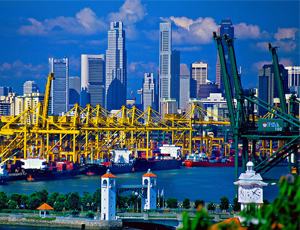Singapore Trade Confidence Reaches a Two-Year High
 SINGAPORE – A twice-yearly survey conducted by HSBC showed that exporters in Singapore were optimistic about trading conditions in the coming months, with its Trade Confidence Index reaching a two-year high of 115. This is up 10 points from the previous survey covering the first half of 2013. Any reading above 100 signals an expected expansion in trade, while a score of 100 represents neutral sentiment.
SINGAPORE – A twice-yearly survey conducted by HSBC showed that exporters in Singapore were optimistic about trading conditions in the coming months, with its Trade Confidence Index reaching a two-year high of 115. This is up 10 points from the previous survey covering the first half of 2013. Any reading above 100 signals an expected expansion in trade, while a score of 100 represents neutral sentiment.
The latest HSBC Trade Confidence Index was conducted in November and December 2013, though the results have only been made public this month. The results are based on a survey of 5,800 exporters, importers and traders from SMEs on a range of issues including trade volumes, risk to suppliers, need and access to trade finance, impact of exchange rates and regulation.
Singapore registered the highest increase in trade confidence out of the ASEAN nations covered in the survey. In contrast, trade confidence in Vietnam increased just 6 points to 106, while confidence in Malaysia and Indonesia dropped by 1 and 8 points, respectively.
RELATED: The TPP’s 16th Round of Negotiation in Singapore
Eighty-two percent of respondents in the survey considered emerging markets in Asia would be Singapore’s most promising trade areas over the next six months, compared with only 74 percent of respondents in the previous survey. HSBC added that the Singaporean government’s initiatives to further encourage research and development will improve the city-states competitiveness and consolidate its position as a hub for financial services and trading port for Asia and, in particular, ASEAN.
In a media release on Tuesday, HSBC stated that confidence in Asia overall remained unchanged from the previous survey. It further observed that longer term prospects were strong, with Asia, along with the Middle East and Latin America, driving growth in global merchandise trade, which will average 8 percent a year from now until 2030.
“Whilst we are seeing a contrasting short-term trade outlook, the longer-term trend for emerging markets remains one of growth and businesses need to consider now how best to capitalize on long-term trade opportunities. An important element of this is investing in research and development, which will allow emerging markets to scale the global value chain. Importantly, developed economies need to enhance their research and development spend if they are to remain competitive,” noted James Emmett, HSBC’s Global Head of Trade and Receivables.
The survey’s respondents also considered Asia to be the most promising region for trade, with 42 percent believing that it held the best opportunities for business growth.
You can stay up to date with the latest business and investment trends across Asia by subscribing to Asia Briefing’s complimentary update service featuring news, commentary, guides, and multimedia resources.
Related Reading
 An Introduction to Tax Treaties Throughout Asia
An Introduction to Tax Treaties Throughout Asia
In this issue of Asia Briefing Magazine, we take a look at the various types of trade and tax treaties that exist between Asian nations. These include bilateral investment treaties, double tax treaties and free trade agreements – all of which directly affect businesses operating in Asia.
Telecommunications Companies Join to Install Cables from Singapore to Europe









